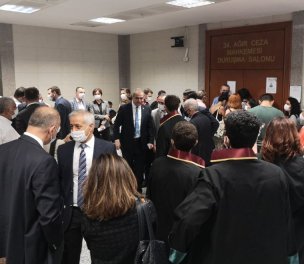Click to read the article in Turkish
As part of its Turkey Indictment Project, PEN Norway has prepared a report regarding the indictment brought against journalists on the grounds that they allegedly revealed the identity of a National Intelligence Organization (MİT) officer who had been killed in Libya.
Prepared by Şerife Ceren Uysal, a lawyer from the İstanbul Bar Association, the report has referred to the prison sentences given to the journalists in this trial and noted that the process of appeals is still ongoing.
As per the verdict handed down by the local court: • Aydın Keser, Ferhat Çelik and Murat Ağırel were sentenced to four years, eight months and seven days' imprisonment for the offence of "disclosure of information and documents relating to intelligence activities in a successive manner" pursuant to Article 27/3 of the (National Intelligence Organization (MİT) Law. • Barış Pehlivan and Hülya Kılınç, in turn, were sentenced to three years and nine months' imprisonment for the offence of "disclosure of information and documents relating to intelligence activities" pursuant to Article 27/3 of the MİT Law. • The remaining defendants were given full release as part of the verdict. • The separation of the case against Erk Acarer, who had fled abroad, was ordered. • Municipal employee E.E. was acquitted and the charge laid against E.E. was • Barış Terkoğlu was also acquitted on all charges, while the charge laid against Terkoğlu was stated to be "not defined as a crime by law." |
'An effort to engender a negative perception'
The report of PEN Norway has analyzed the indictment under four main chapters/questions, namely the following: "Overview of the indictment", "Can both Article 329/1 of the Turkish Criminal Code (TCC) and Article 27/3 of the MİT Law be invoked with respect to the suspects' acts?", "Can previously disclosed information be 're-disclosed?'" and "Legal violations resulting from neglected juristic classification in the indictment."
"Following the first hearing, the prosecutor was given time to offer a recommendation. The recommendation was submitted to the file a mere day before the second hearing," lawyer Şerife Ceren Uysal has underlined in the report and reminded the public that "the indictment starts out with a brief section touching on the (07.02.2012) events known publicly as the "MİT Crisis" and the incident in which MİT were halted in 2014."
Against this background, the lawyer has emphasized the following points in brief: "However, it is apparent when the indictment is taken as a whole that these sections have no bearing on the charges laid against either the suspects or the suspects' acts. There was no identifiable legal requirement for the inclusion of this section in the indictment.
"A detailed analysis of the text accompanying each of the intermediary headings reveals that a number of matters are broached that are not directly related to the investigation and a large number of long citations are made. This state-of-affairs seriously inhibits comprehensive reading of the indictment.
"With the indictment prosecutors contenting themselves with briefly summarising the suspects' defences or witness testimony, they have cited verbatim the two separate criminal complaints made by MİT, including the 'conclusion and requested' sections.
"Not only are either events recounted in this section related to the subject-matter of the indictment, but the classification of events that are subject to other legal proceedings by the prosecutors as 'disinformation' is problematic in its own right.
"The 'interpretation' of events that do not directly originate from the acts attributed to the suspects, which are the subject of separate legal proceedings, is redolent of an effort to engender a negative perception of the suspects."
'Disclosed information cannot be re-disclosed'
In the second chapter of the analysis, it is asked, "Can both Article 329/1 of the TCC and Article 27/3 of the MİT Law be invoked with respect to the suspects' acts?" This question is answered briefly as follows:
"If one concedes that Article 27/3 of the MİT Law is a specific norm and that Article 329/1 of the TCC is a general norm, then one must concede that there is no legal basis for the simultaneous invocation of both with respect to each of the suspects' individual actions. Moreover, given that the norm that must be applied here is the specific norm, it is beyond dispute that Article 27/3 of the MİT Law must be invoked. It is contrary to the law for both a general and specific norm to be invoked separately in the charges."
Underlining that "previously disclosed information cannot be 're-disclosed'", Uysal has said, "This point is one of basic importance as far as the indictment is concerned. The indictment prosecutors have, in fact, continually circled this point throughout the fifty-page text."
"But it must be noted that the issue here is not the prosecutors engaging in interpretation, but their embarking on the endeavour of alleging a crime through their interpretation," the lawyer has added further.
'Is it an indictment in a legal sense?'
In the fourth chapter of the analysis, it is asked, "Is the object of scrutiny truly an indictment in a legal sense?" Lawyer Şerife Ceren Uysal has answered this question briefly as follows:
"As has been determined in virtually all the reports issued up-until now, in the case of this indictment, too, accusatory comments concerning this investigation and the suspects' acts were ascertained to have been made by executive-level politicians before the indictment had even been drafted.
"The encountering of a similar phenomenon as in virtually all the scrutinised indictments begs investigation as to whether this demeanour by the executive branch has been made into a vehicle for bringing decisive pressure to bear on prosecutors as a component of the judiciary in determining the content of the aforementioned indictments.
"Sadly, a portion of the deficiencies identified in this report relate to the most basic legal principles and, as has been stressed in the report, as much as the errors that were made, the omissions of what has been required have further compounded the injustice faced.
"What has been concluded in this examination, conversely, is not the effort to perform a filtering duty but, on the contrary, a tendency to put oneself in the position of the legislator. In conjunction with this, despite the absence of a provision attributing unlawfulness to a portion of the suspects' actions and that this matter be determinable from a simple analysis, the ignoring of these phenomena can be accounted for either by defective legal knowledge or the strong desire on the part of the prosecutors for the suspects to be punished notwithstanding the statutory provisions. Either situation is manifestly unlawful.
"Not bringing up unjust cases – that is, not issuing needless indictments – should indeed be paramount alongside the basic concerns of a Public Prosecutor.
"The most basic proposal that suggests itself, given the analysis of this indictment, is for the said indictment to be open to discussion at the educational level of law faculties as an example as to 'how an indictment should not be drafted' because, due to the deficiencies that have been discussed in detail above, it does not even satisfy the minimum criteria expected of such a document." (HA/SD)




.jpg)


